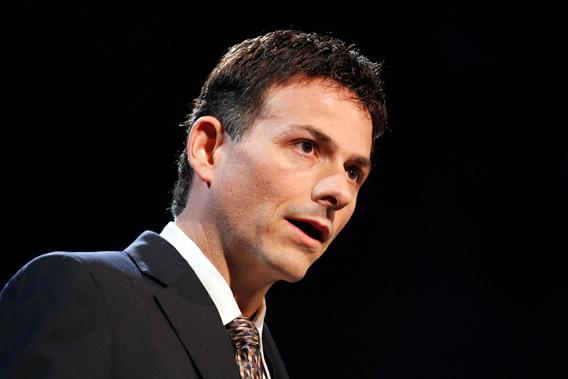After soaring to more than $705 a share in September, Apple stock entered a months-long slide, closing Monday below $419. The reasons for the slide aren’t secret and they aren’t crazy: Samsung has proved it can produce excellent smartphones that people like, Amazon is making tablets, and Apple’s iconic CEO is dead.
The past few months of modestly bad news and increased competition really have no bearing on the all-important question of whether the company can or will develop new blockbuster products in the years to come. But the recent weakness has opened the company’s management up to second-guessing not only about its products but about corporate strategy—particularly its staggering $135 billion in accumulated cash and other short-term investments.
That’s an awful lot of money. All the outstanding shares of Amazon combined, for example, are only worth $124 billion. McDonald’s is worth $94 billion. In fact, there are fewer than 20 companies in the S&P 500 whose total value exceeds the $135 billion Apple has stashed in the bank.
And that’s what makes the fall in Apple’s share price so strange. One simple way of assessing a company’s stock is to look at what’s called the price-to-earnings ratio—the value of all its stock divided by a year’s worth of profits. Apple’s current PE ratio is 9.5, which is on the lowish side. That is the kind of ratio expected from an electrical utility, an oil company, or some other business that’s sound but with a weak growth outlook.
But a simple PE ratio doesn’t consider the value of cash on hand. If you assume each $1 that Apple has in the bank is worth $1, then the entire rest of the company—the patents, the personnel, the brand, the stores, the supplier relationships, everything—are worth only $265 billion. That gives the business, viewed as an ongoing enterprise, a PE ratio of about 6.3. That’s preposterously low. To look at it another way, you can take the inverse of a stock’s PE ratio and get the earnings yield—the profits you would pocket if you bought the whole company. Excluding cash, Apple has an earnings yield of almost 16 percent. That’s insanely high at a time when junk bonds are yielding less than 7 percent. Taken literally, that reflects an extraordinarily pessimistic view of a company that continues to offer the world’s most popular smartphone, most popular tablet, and a growing PC business.
Which probably goes to show that we shouldn’t take the stock price literally. The financial markets are sharply discounting the value of Apple’s cash: They actually think it is worth less than its face value. And that’s why some Apple shareholders are increasingly vocal about the idea that they’d like some of it.
One high-profile idea is hedge-fund manager David Einhorn’s proposal for Apple to issue preferred shares with a guaranteed lifetime dividend, cutely dubbed “iPrefs.” Morgan Stanley’s Katy Huberty thinks Apple can and will simply use its strong cash position to borrow money and pay shareholders. Warren Buffett has the most straightforward proposal of all: If Apple’s large cash heap is causing its stock to be undervalued, why doesn’t Apple spend the money on buying Apple stock?
These proposals all have different advantages and disadvantages, but Apple management deflects them all with vague allusions to strategic flexibility and the sensible observation that it’s important to stay focused on the actual products rather than managing the share price.
This still raises the question of why piling up short-term securities is what Tim Cook wants to do with his profits. He could go out and spend it on sexy acquisitions—Dropbox! Pandora!—to build strength in online services where the company is weak. He could follow in the footsteps the rich tech companies of yesteryear and acquire content companies—think Sony or, less promisingly, AOL Time Warner.
A more boring option would be to cut price and deliberately sacrifice short-term earnings for market share. Apple allegedly sells all the iPhones it can make, but it seems very likely that people would buy more Macs if they were cheaper. Apple’s 30 percent cut of app sales seems steep, and it’d be easy to imagine deliberately sacrificing that revenue and other content sales commissions as a worthwhile investment in the overall strength of the platform.
Yet the sobering thought for Apple shareholders (a group that, full disclosure, includes me in a minor way) should be that if management doesn’t want to do anything with the cash, nobody can stop them. A $40 billion company with $13.5 billion cash on hand and a 9.5 PE ratio would be a tempting leveraged-buyout target for a daring corporate raider. But with the largest buyout in history having topped off at an inflation-adjusted $57 billion way back in 1989, Apple is much too large to swallow. And unlike at Google or Amazon or Facebook, nobody involved in running Apple owns a large share of it, so they have no particularly compelling reason to care what shareholders think. And the very size of the cash stockpile means there’s no plausible scenario under which they’d need to turn to financial markets for investment funds of any kind. Apple executives are free to do whatever they want with that money and essentially always will be. And that growing realization is likely exactly what’s turned markets against the company.
